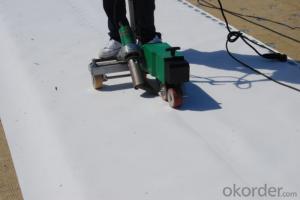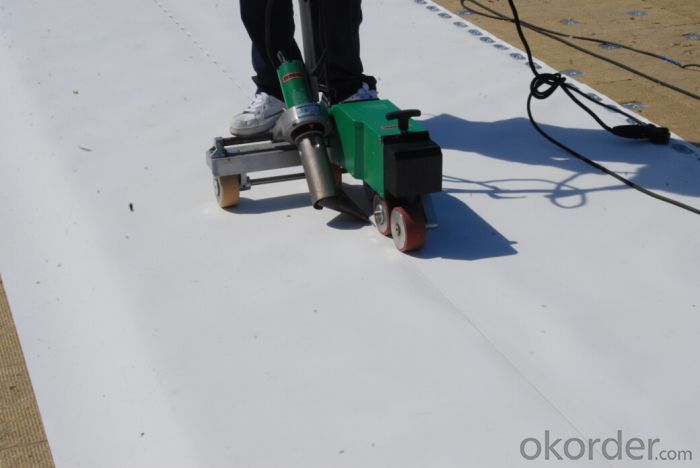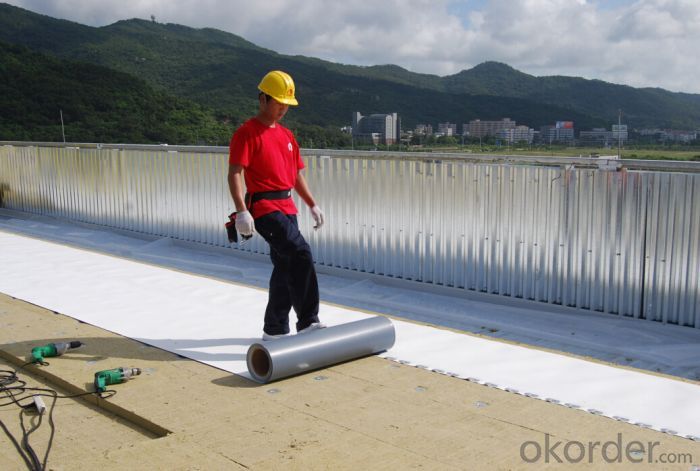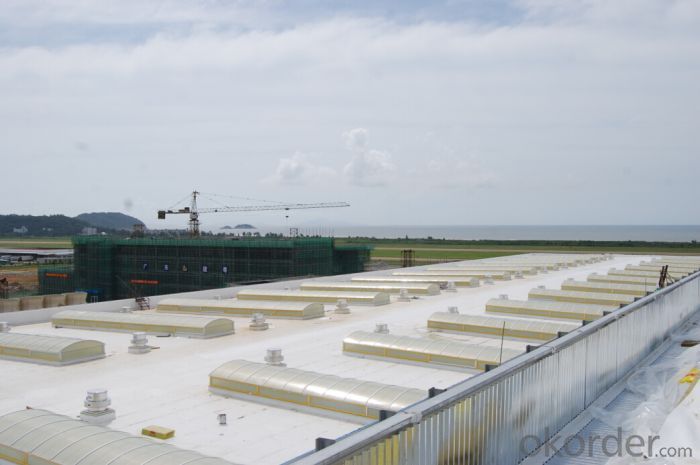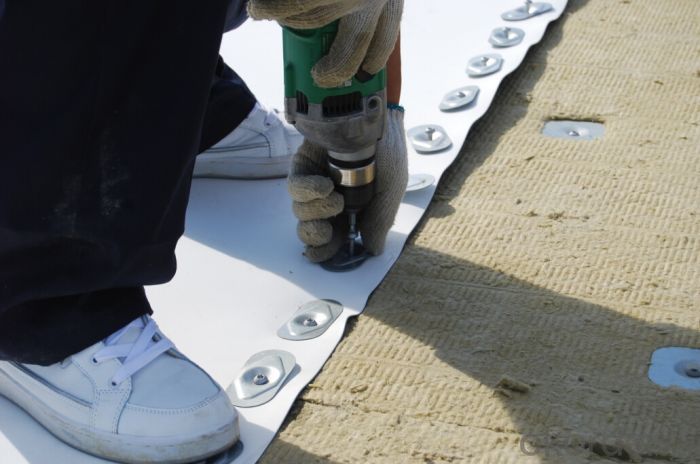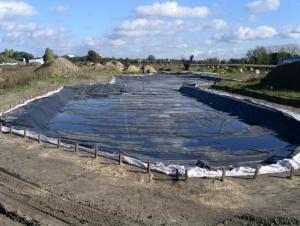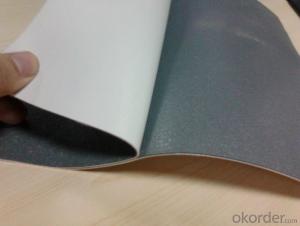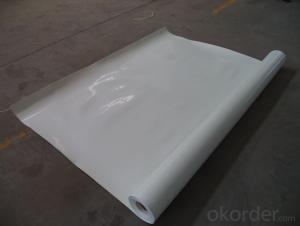TPO Waterproof Membrane 1.5mm with Largest Supplier in China
- Loading Port:
- China Main Port
- Payment Terms:
- TT or LC
- Min Order Qty:
- 5000 m²
- Supply Capability:
- 100000 m²/month
OKorder Service Pledge
OKorder Financial Service
You Might Also Like
TPO Waterproof Membrane
TPO is a waterproofing sheet, consisting of thermoplastic polyolefin, and compound resin materials as the base stock, reinforced with polyester mesh fabric.
Product Applications:
● Various roofing waterproof projects, such as industrial and civil buildings,
● Mechanically attached waterproofing system.
Product Advantages:
1. Weather resistance and durability; Excellent weld ability;
2. No any crisp agents to prevent materials brittleness;
3. Intermediate enhanced polyester mesh fabric to have high tensile strength, fatigue resistance and penetrating resistance suitable for mechanically attached roofing systems;
4. Excellent the same high and low temperature resistance as rubber materials which can keep flexible at -50° C and keep mechanical strength in high temperature;
Main Product Features:
1.. Excellent chemical resistance to acids, bases, and restaurant exhaust emissions; Dimension stability;
2.. White-based light-color and smooth surface with high reflection, energy saving and anti-dust functions;
3. Use heat welding for the seam areas to form a reliable seamless waterproof layer.
Product Specifications:
Item | Requirement | Test Method | ||
Thickness, min, mm | Sheet-overall | ≥1.0 | ASTM D6878 | |
Coating over fabric or scrim, weathering side only | ≥0.305 | ASTM D751 | ||
Breaking strength, min, N | ≥976 | ASTM D751 | ||
Elongation at reinforcement break, min, % | ≥15 | ASTM D751 | ||
Tearing strength,min, N | ≥245 | ASTM D751 | ||
Brittleness point, max, °C | ≤-40 | ASTM D2137 | ||
Ozone resistance | no cracks | ASTM D1149 | ||
Properties after heat aging | Breaking strength, % min | ≥90 | ASTM D573 | |
Elongation at reinforcement break, % min | ≥90 | ASTM D573 | ||
Tearing strength, % min | ≥60 | ASTM D573 | ||
Weight change (mass), max % | ≤±1 | ASTM D573 | ||
Linear dimensional change, max, % | ≤±1 | ASTM D1204 | ||
Water absorption, max, mass % | ≤±3.0 | ASTM D471 | ||
Factory seam strength, min, N | ≥290 | ASTM D751 | ||
Weather resistance | Visual inspection | - | ||
FAQ:
Q: Can I visit your company?
A: Yes, welcome to visit our enterprise.
Q: Can I do the third party testing before loading?
A: Yes, we could accept the third party testing.
Q: Which kind of payment in your company?
A: We could accept TT, LC at sight, etc.
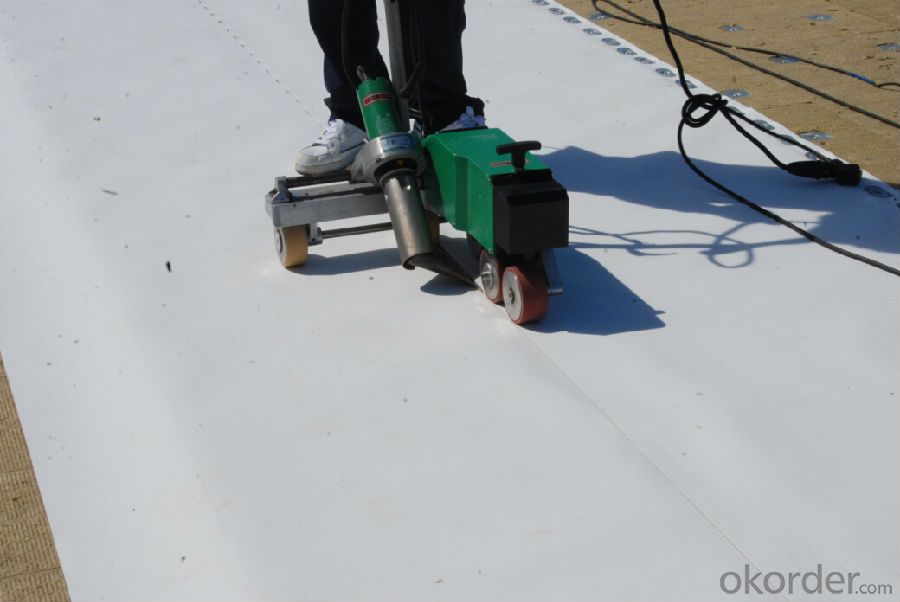
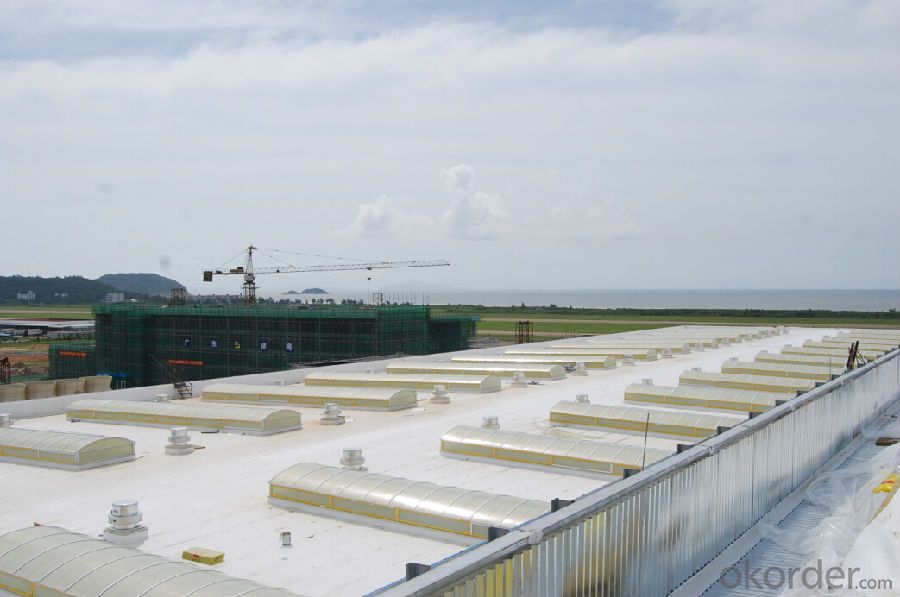
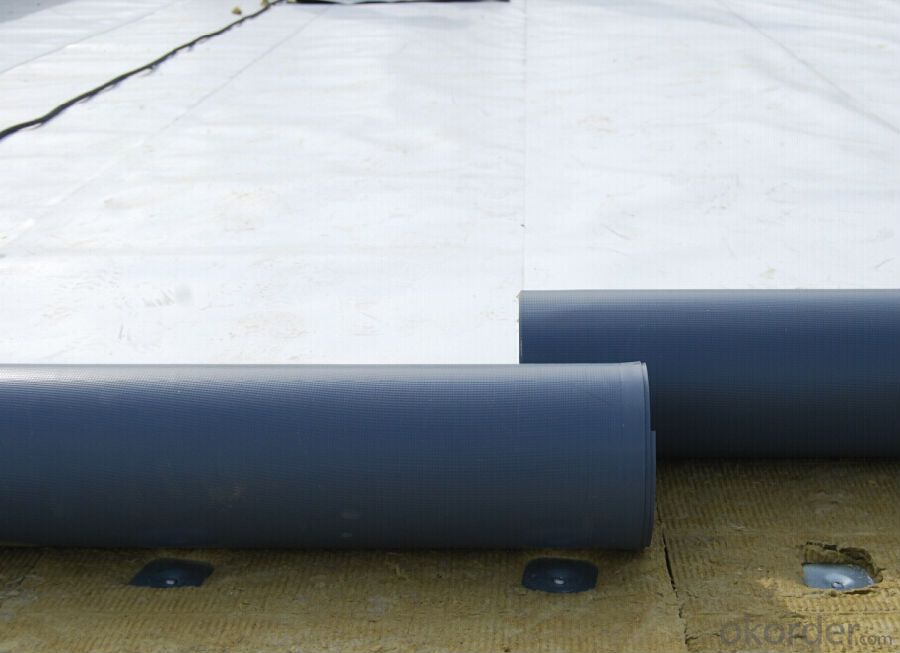
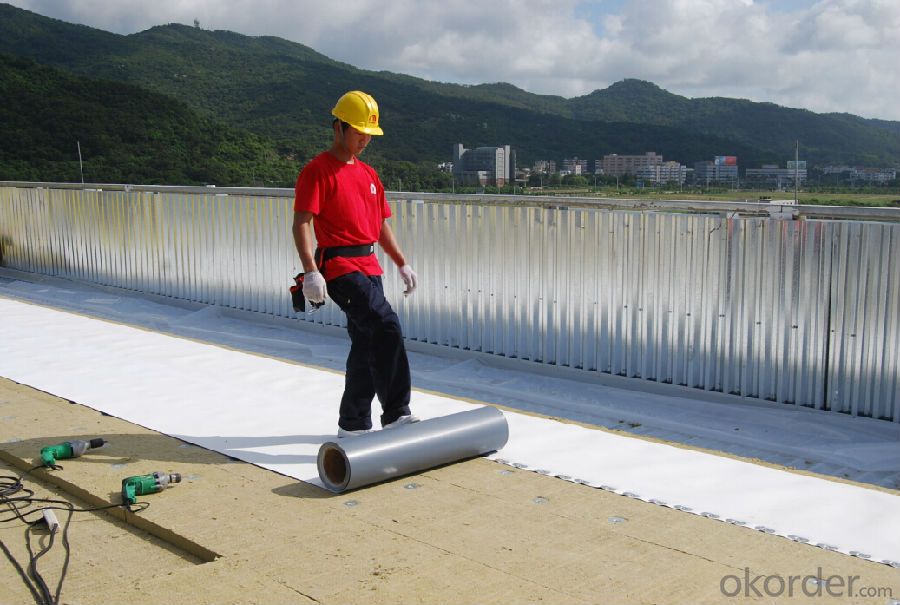
- Q: Can a waterproofing membrane be used in areas with high humidity?
- Yes, a waterproofing membrane can be used in areas with high humidity. In fact, high humidity can often contribute to the need for waterproofing as it can lead to moisture buildup and potential water damage. Waterproofing membranes are designed to create a barrier that prevents water from seeping through surfaces, such as walls or floors. They can effectively protect against moisture and water infiltration, which is particularly important in high humidity areas where the risk of water damage is greater. By applying a waterproofing membrane, you can significantly reduce the likelihood of mold, mildew, and other moisture-related issues in these environments.
- Q: Can a waterproofing membrane be used for underground utility vaults?
- Yes, a waterproofing membrane can be used for underground utility vaults. These membranes are designed to provide a barrier against water infiltration and are commonly used in various construction applications, including underground structures like utility vaults. Waterproofing membranes can help prevent water damage, corrosion, and leakage in underground vaults, ensuring the protection and longevity of the utilities and equipment housed within them.
- Q: Does a waterproofing membrane require any special considerations for installation in seismic zones?
- Yes, a waterproofing membrane does require special considerations for installation in seismic zones. Seismic activity can cause significant ground movement and structural vibrations, which can potentially compromise the integrity of the membrane. Therefore, it is crucial to select a membrane that is specifically designed and tested to withstand seismic conditions. Additionally, proper installation techniques and materials, such as reinforced membranes and flexible adhesives, should be used to ensure the membrane remains intact during seismic events.
- Q: Can a waterproofing membrane be used for shopping malls or commercial buildings?
- Yes, a waterproofing membrane can be used for shopping malls or commercial buildings. Waterproofing membranes are commonly used in construction to protect the structure from water damage. They are specifically designed to create a barrier against water infiltration, preventing leaks and moisture buildup. By applying a waterproofing membrane to the building's exterior, it helps to ensure the longevity and durability of the structure. Shopping malls and commercial buildings often have large surface areas that are exposed to different weather conditions, making them susceptible to water damage. Therefore, using a waterproofing membrane is an effective solution to protect these buildings and maintain their structural integrity.
- Q: Can a waterproofing membrane be used on plywood surfaces?
- Yes, a waterproofing membrane can be used on plywood surfaces. Plywood is a commonly used material for construction, including outdoor projects such as decks and balconies. However, plywood is not naturally waterproof and can be susceptible to moisture damage over time. To protect plywood surfaces from water damage, a waterproofing membrane can be applied. This membrane acts as a barrier, preventing water from seeping into the plywood and causing rot or decay. There are various types of waterproofing membranes available, including liquid-applied membranes, sheet membranes, and peel-and-stick membranes. These membranes are designed to adhere to the surface of the plywood and create a watertight seal. It is important to follow the manufacturer's instructions for proper application and ensure that the plywood surface is clean and dry before applying the membrane. By using a waterproofing membrane, plywood surfaces can be effectively protected from water damage, extending their lifespan and maintaining their structural integrity.
- Q: Can a waterproofing membrane be painted or covered with a protective layer?
- Yes, a waterproofing membrane can be painted or covered with a protective layer. This can help enhance its durability and resistance to external elements. However, it is important to ensure that the paint or protective layer used is compatible with the waterproofing membrane to maintain its effectiveness and prevent any potential damage.
- Q: Can a waterproofing membrane be used for wastewater treatment plants or sewage facilities?
- Yes, a waterproofing membrane can be used for wastewater treatment plants or sewage facilities. It helps to prevent water leakage, ensuring the containment and proper treatment of wastewater or sewage.
- Q: Can a waterproofing membrane be used for an industrial facility floor?
- Yes, a waterproofing membrane can be used for an industrial facility floor. Waterproofing membranes are commonly used in industrial settings to protect floors from water damage and to prevent moisture from seeping into the concrete or substrate. These membranes are designed to create a seamless and impermeable barrier that can withstand heavy foot traffic, industrial equipment, and chemical spills. They can also provide additional benefits such as resistance to mold and mildew growth, increased durability, and easier maintenance. However, it is important to choose a waterproofing membrane that is specifically designed for industrial applications and to follow the manufacturer's instructions for proper installation and maintenance.
- Q: Are waterproofing membranes resistant to gasoline vapors?
- Yes, waterproofing membranes are generally resistant to gasoline vapors. They are designed to create a barrier against moisture and other liquids, including gasoline and its vapors.
- Q: Can a waterproofing membrane be used on tunnels with electrical installations?
- Yes, a waterproofing membrane can be used on tunnels with electrical installations. These membranes are designed to provide a protective barrier against water ingress, ensuring the safety and functionality of electrical installations in tunnels.
Send your message to us
TPO Waterproof Membrane 1.5mm with Largest Supplier in China
- Loading Port:
- China Main Port
- Payment Terms:
- TT or LC
- Min Order Qty:
- 5000 m²
- Supply Capability:
- 100000 m²/month
OKorder Service Pledge
OKorder Financial Service
Similar products
Hot products
Hot Searches
Related keywords
